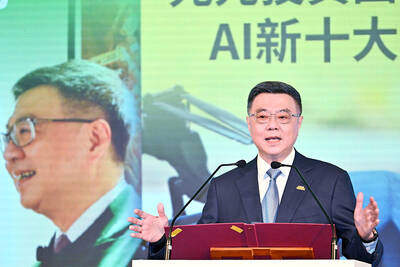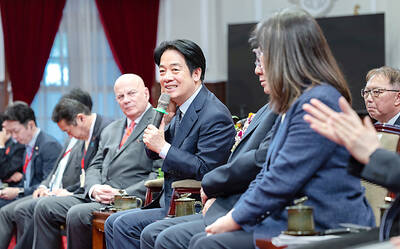China is using personal connections and the Internet as main channels to infiltrate Taiwan, the Ministry of National Defense (MND) said at a meeting of the legislature’s Foreign Affairs and National Defense Committee yesterday.
The ministry and other national security agencies have implemented measures to improve discipline within the military and military equipment management, as well as to prevent sensitive national defense information from leaking to China.
The ministry has drawn up plans to counter China’s attempts to infiltrate Taiwan, a report the ministry submitted to the committee said.

Photo: Chu Pei-hsiung, Taipei Times
China has been targeting Taiwanese who have friends or relatives who are Chinese nationals in its infiltration efforts, which are also conducted through criminal gangs and the Internet, it said.
The ministry has amended regulations related to the safety examination of military personnel, identified high-risk targets, encouraged people to report misconduct, and improved the management and transfer process of military documents, it said.
Since 2011, judicial authorities have been prosecuting espionage cases involving current and retired military personnel, the ministry said, adding that 86.8 percent of the cases were reported by ministry officials.
Information security checks have been conducted on all computers and domains used by military personnel, it said.
The protocol and penalties related to transferring military files have been formulated and should be monitored and implemented by confidentiality supervisors at each level, it added.
Beijing’s recent efforts to infiltrate Taiwan have turned to the grassroots and become more comprehensive, the National Security Bureau said.
The more concealed and complicated infiltration tactics being adopted are posing challenges to national security protection, it said.
The bureau has introduced greater incentives to encourage people to report misconduct and would pay closer attention to those who show signs of “abnormal behavior,” it said.
Chinese intelligence departments have been using various channels to intensify their “united front” efforts against Taiwan, aiming to absorb military personnel or people who have access to confidential information, the Investigation Bureau said.
The Investigation Bureau is to bolster its investigation capabilities, including adopting computer forensics and other investigative skills, to improve the accuracy and effectiveness of investigation.
As for an incident involving the theft of a used Stinger missile launcher by an organized crime group, the ministry said in the report that “there are no safety concerns,” but acknowledged “management negligence.”
The ministry would use it as a learning experience to formulate better strategies after a thorough review of the management failure, it said.
Recurring incidents in the armed forces were due to inadequate planning and flawed implementation, for which top-level personnel should be held accountable, Minister of National Defense Chiu Kuo-cheng (邱國正) said.
Asked why the issues were all related to the Marine Corps, Chief of Naval Staff Wu Li-ping (吳立平) said: “It’s our problem and we will reflect deeply on it.”
Commanding officers will be punished for the three recent cases involving missing military equipment, he added.
Responding to lawmakers’ queries, Chiu said that the firing of Li Shangfu (李尚福) as Chinese minister of national defense would not affect Beijing’s policies.
As long as China’s national strategy remains unchanged, its military strategy would not change, he said, adding that the constant threats Taiwan is facing from China would not be changed by Li’s removal.

Two US House of Representatives committees yesterday condemned China’s attempt to orchestrate a crash involving Vice President Hsiao Bi-khim’s (蕭美琴) car when she visited the Czech Republic last year as vice president-elect. Czech local media in March last year reported that a Chinese diplomat had run a red light while following Hsiao’s car from the airport, and Czech intelligence last week told local media that Chinese diplomats and agents had also planned to stage a demonstrative car collision. Hsiao on Saturday shared a Reuters news report on the incident through her account on social media platform X and wrote: “I

STILL ON THE TABLE: The government is not precluding advanced nuclear power generation if it is proven safer and the nuclear waste issue is solved, the premier said Taiwan is willing to be in step with the world by considering new methods of nuclear energy generation and to discuss alternative approaches to provide more stable power generation and help support industries, Premier Cho Jung-tai (卓榮泰) said yesterday. The government would continue to develop diverse and green energy solutions, which include considering advances in nuclear energy generation, he added. Cho’s remarks echoed President William Lai’s (賴清德) comments in an interview last month, saying the government is not precluding “advanced and newer nuclear power generation” if it is proven to be safer and the issue of nuclear waste is resolved. Lai’s comment had

‘BUILDING PARTNERSHIPS’: The US military’s aim is to continue to make any potential Chinese invasion more difficult than it already is, US General Ronald Clark said The likelihood of China invading Taiwan without contest is “very, very small” because the Taiwan Strait is under constant surveillance by multiple countries, a US general has said. General Ronald Clark, commanding officer of US Army Pacific (USARPAC), the US Army’s largest service component command, made the remarks during a dialogue hosted on Friday by Washington-based think tank the Center for Strategic and International Studies. Asked by the event host what the Chinese military has learned from its US counterpart over the years, Clark said that the first lesson is that the skill and will of US service members are “unmatched.” The second

STANDING TOGETHER: Amid China’s increasingly aggressive activities, nations must join forces in detecting and dealing with incursions, a Taiwanese official said Two senior Philippine officials and one former official yesterday attended the Taiwan International Ocean Forum in Taipei, the first high-level visit since the Philippines in April lifted a ban on such travel to Taiwan. The Ocean Affairs Council hosted the two-day event at the National Taiwan University Hospital International Convention Center. Philippine Navy spokesman Rear Admiral Roy Vincent Trinidad, Coast Guard spokesman Grand Commodore Jay Tarriela and former Philippine Presidential Communications Office assistant secretary Michel del Rosario participated in the forum. More than 100 officials, experts and entrepreneurs from 15 nations participated in the forum, which included discussions on countering China’s hybrid warfare